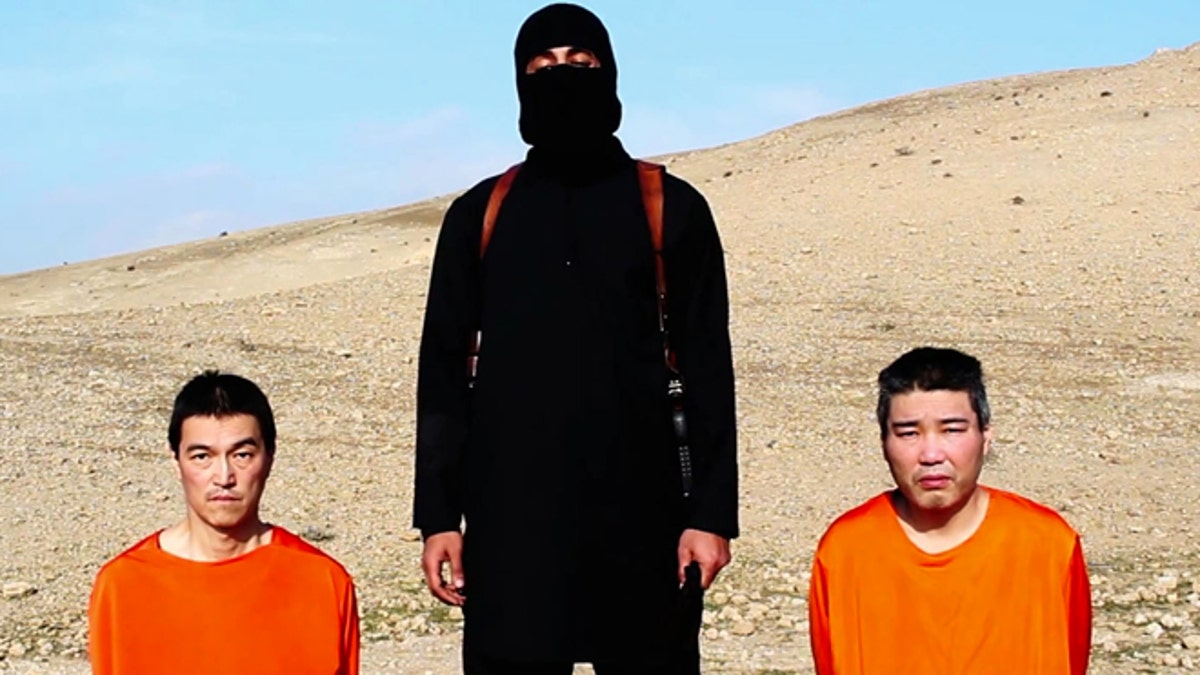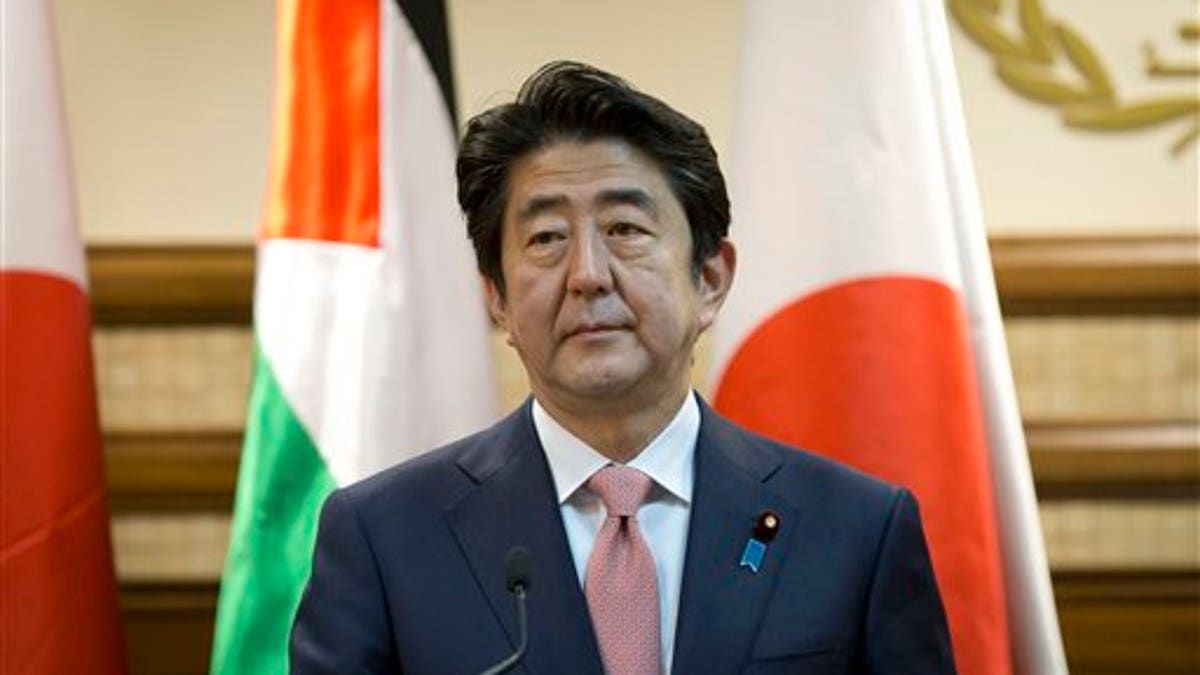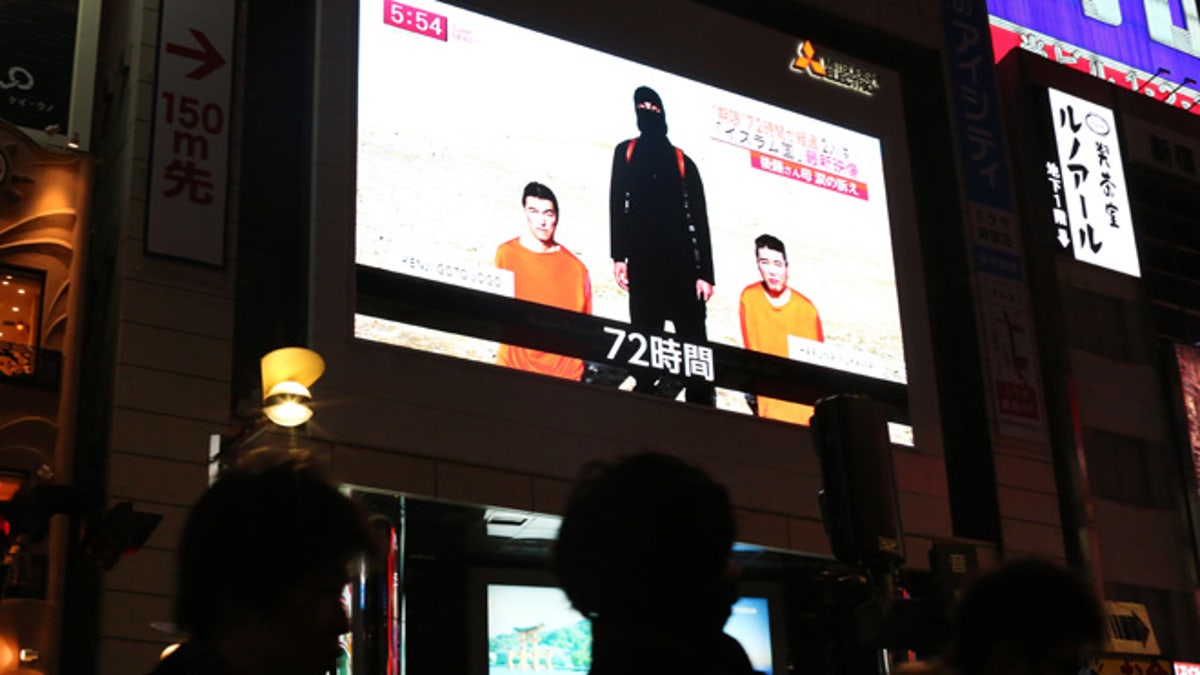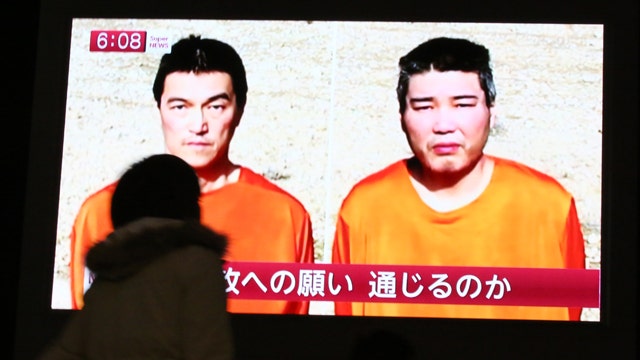ISIS: 'Countdown has begun' for Japan to pay for hostages
Catherine Herridge reports from Washington, D.C.
The deadline imposed by ISIS for Japan to pay $200 million to free two captives passed, starting what the terrorist group called a countdown clock on Friday, even as questions swirled about the authenticity of the initial tape and whether the pair is even alive.
A tweet from a Twitter account linked to ISIS said the hostages had been killed "because of Japan's choices." The tweet, on the same one that previously posted the countdown clock, warned that a new video was "being sent to production." Intelligence sources told Fox News the claim the hostages had been killed could not be confirmed, but said the situation is being monitored as they await release of a new video.
In a video released Tuesday, Kenji Goto, a journalist, and Haruna Yukawa, who runs a security company, were threatened with beheading by the barbaric terror organization if the Japanese government did not pay the staggering on ransom. The video, posted on militant websites and identified as being made by the Islamic State group's al-Furqan media arm, appeared to have been shot in the same location as those showing American hostages James Foley, Steven Sotloff and Peter Kassig, and British captives David Haines and Alan Henning.
Japan has said it is working to free the hostages, but has not stated whether it would pay the ransom. Japanese Prime Minister Shinzo Abe convened his National Security Council to discuss how to handle the crisis.
The hostage video showing the hostages wearing orange jump suits and kneeling before a masked, black-clad jihadist may have been faked, experts said. New analysis of the video appears to reveal the message was shot indoors using a "green screen," and a phony backdrop, according to Veryan Khan, editorial director for the Terrorism Research and Analysis Consortium. She told The Associated Press the light source on the men in the latest videos appears to be coming from two different directions — as opposed to one bright sun, and said if the video was made outdoors in natural light, the shadows behind them should be going in one direction. Instead, they converge.
"My son is not an enemy of the Islamic State."
"The hostages are visibly bothered by" the bright light, she said.
Although one of the hostage's jumpsuits flutters in a breeze, Khan said she believes a fan caused the movement and noted that wind in the desert would be noisy and affect the sound quality of the statements being made by the knife-wielding man. It would also kick up dust, and none seems apparent, she said.

This image taken from an online video released by the Islamic State group's al-Furqan media arm on Tuesday, Jan. 20, 2015, purports to show the group threatening to kill two Japanese hostages that the militants identify as Kenji Goto Jogo, left, and Haruna Yukawa, right, unless a $200 million ransom is paid within 72 hours. Japan's Foreign Ministry's anti-terrorism section has seen the video and analysts are assessing it, a ministry official said on Tuesday. (AP Photo) (AP)
Experts poring over the slickly-produced videos believe they were made in an area south of Raqqa in northern Syria, the self-declared capital of the Islamic State group. The killings of the five other hostages took place between August and November. The U.S.-led coalition began targeting IS militants in Syria in mid-September, and has gradually intensified its aerial bombardment of suspected IS infrastructure in both Syria and Iraq.
In Japan, government officials and family members of the hostages were desperate to save the men.
"Time is running out. Please, Japanese government, save my son's life," said Junko Ishido, the mother of 47-year-old journalist Kenji Goto.
"My son is not an enemy of the Islamic State," she said in a tearful appearance in Tokyo.

Japanese Prime Minister Shinzo Abe attends a joint press conference with Palestinian President Mahmoud Abbas at the Palestinian Authority headquarters, in the West Bank city of Ramallah, Tuesday, Jan. 20, 2015. An online video released Tuesday purported to show the Islamic State group threatening to kill two Japanese hostages unless they receive a $200 million ransom in the next 72 hours. (AP Photo/Nasser Nasser) (AP)
Ishido said she was astonished and angered to learn from her daughter-in-law that Goto had left less than two weeks after his child was born, in October, to go to Syria to try to rescue the other hostage, 42-year-old Haruna Yukawa.
"My son felt he had to do everything in his power to try to rescue a friend and acquaintance," she said.
In very Japanese fashion, Ishido apologized repeatedly for "all the trouble my son has caused."
The national broadcaster NHK reported early Friday that it had received a message from ISIS "public relations" saying a statement would be released soon.
Lacking clout and diplomatic reach in the Middle East, Japan has scrambled for a way to secure the release of the two men, one a journalist, the other an adventurer fascinated by war. Two Japanese who said they have contacts with an ISIS leader offered Thursday to try to negotiate, but it was unclear if the Japanese government was receptive to the idea.
Ishido said she had not had any contact with the government.
Government spokesman Yoshihide Suga reiterated Friday that Japan was trying all possible channels to reach those holding the hostages, and that its policy of providing humanitarian aid for those displaced by conflict in the Middle East was unchanged.
"We are doing our very best to coordinate with related parties, including through tribal chiefs," Suga said.
Japan has joined other major industrial nations of the Group of Seven in opposing ransom payments. U.S. and British officials also said they advised against paying.
Tokyo lacks strong diplomatic connections in the Middle East, and Japanese diplomats left Syria as the civil war there escalated, adding to the difficulty of contacting the group holding the hostages.

A TV news program reports two Japanese hostages held by the Islamic State group in Tokyo, Friday, Jan. 23, 2015. Militants affiliated with the Islamic State group have posted an online warning that the "countdown has begun" for the group to kill a pair of Japanese hostages. (AP Photo/Eugene Hoshiko) (AP)
There was no sign the government had taken action on an offer to try to negotiate with ISIS by Ko Nakata, an expert on Islamic law and former professor at Kyoto's Doshisha University, along with freelance journalist Kousuke Tsuneoka.
Nakata and Tsuneoka, who both are converts to Islam, said Thursday that they have a contact in ISIS and were prepared to go to Syria.
Nakata and Tsuneoka, who was released after being held hostage in Afghanistan in 2010, visited Syria in September in an unsuccessful attempt to gain Yukawa's release. Goto was seized sometime after late October when he entered the area.
Since Japan's military operates only in a self-defense capacity a home any rescue attempt would require help from an ally like the United States.
The Associated Press contributed to this report.









































